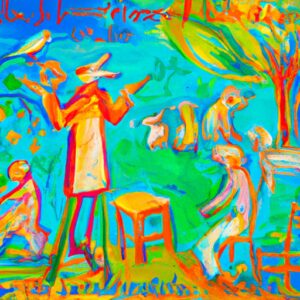Learn the Essential Italian Sentences
When you want to learn a foreign language, you don’t start with complex phrases or B2-level conversations.
Instead, you learn the most basic words and combine them to express concepts, ideas, and feelings.
Step by step, you expand your vocabulary and grammar and express the same concepts in a more complex way.
That’s why you don’t have to get discouraged if you can’t understand Italian at first. It takes time and commitment to have a conversation in Italian.
The good news is that you can become fluent quicker if you learn the most common words and phrases and lay the foundation to learn more complex expressions.
Learning a foreign language is a powerful way to build your “brain muscles” because you make new neuronal connections and have a healthier brain. It takes time, so be patient and do it step-by-step.
Basic Sentences in Italian: Tips for Beginners
An Italian sentence is composed of a subject and a verb and expresses a complete concept.
Sono stanco.
I’m tired.
Ho fame.
I’m hungry.
Voglio uscire.
I want to go out.
In all the examples above, the subject is io (I), but it is never explicit. Italians use to omit the subject of the phrase if it’s clear from the context.
You don’t express the subject of a sentence unless you want to emphasize your action. For example, you could say Io ho fame, tu no (I’m hungry, you aren’t) to explain that you feel hungry while others don’t. Io sono stanco could be a way to highlight that you’re really tired and want to sleep.
Basic Italian phrases you should know
Knowing a bunch of common Italian words and sentences is helpful to start learning Italian if you’re a beginner.
You will become confident with new words and phrases, improve your understanding of the language, and enhance your fluency.
If you’re planning a trip to Italy, learning the basic sentences will help you communicate with locals.
Having a good grasp of the Italian language is not a necessary requirement to move to Italy, but it definitely helps you interact with locals and settle down.
It seems that in each case, learning the most common Italian phrases is good for boosting your language-speaking skills!
How to Improve Your Speaking if You Don’t Have a Speaking Partner?
Are you struggling to improve Italian-speaking skills, because you don’t have a conversation partner?
Or, your Italian friends are fantastic to hang out, but they don’t correct you as often as you’d like. If that’s the case, you can get an AI tutor, powered by GPT technology, and engage in unlimited, beginner, intermediate or advanced conversations, based on your level, through both text or speech.
While you chat, you get instant feedback on your errors. Plus, you can switch between Italian and English at any time. Not only you’ll be improving your written skills, grammar and vocabulary, but spoken skills and pronunciation as well.
Basic Italian words
Some words are essential to interact with people and having a basic conversation in Italian. Here are they:
Sì
No
No
Grazie
Thank you
Grazie mille
Thank you very much
Prego
Di niente!
It’s nothing!
Ciao
Hi
Per favore/per cortesia/per piacere
Please
Common greetings: how to say hello?
One of the first things you need to know is how to greet people when you meet them.
Italian greetings are not limited to the famous ciao! (which means hi and is, perhaps, the most popular Italian word).
You can use different greetings according to the time of the day, the environment, and the people you meet.
In general, Italian people use informal greetings with friends or young people.
Formal greetings are used in different situations:
- When they meet new people;
- At hotels or restaurants;
- With public officers;
- In business meetings;
- With elderly people.
What are the most common Italian greetings besides ciao?
Salve!
Hi! (At any time of the day)
Buongiorno
Good morning/afternoon
Buonasera
Good evening
Arrivederci
Buonanotte
Good night
Here are the phrases to use when you meet someone for the first time:
Piacere!
Nice to meet you!
Mi chiamo…
My name is…
Sono …
I am … (your name)
If you want to ask someone’s name, you can use either the formal or the informal way:
Come ti chiami?
What’s your name? (informal)
Come si chiama?
What’s your name? (formal)
Here’s how you can ask for the nationality or hometown:
Di dove sei?/Da dove vieni?
Where are you from? (informal)
Di dov’è?/Da dove viene?
Where are you from? (formal)
Sono americano/a
I’m American
When you meet someone, you can also ask for their age. Remember that it is considered unpolite to ask this question to a woman.
Quanti anni hai?
How old are you? (informal)
Quanti anni ha?
How old are you? (formal)
Asking for time and day
Our daily lives are full of appointments, tasks, and schedules. That’s why it is essential to know how to say the time and the day in Italian.
Che ore sono?
What time is it?
A che ora parte il treno?
At what time does the train leave?
A che ora ci vediamo?
At what time shall we meet?
Ti aspetto alle 17:00!
I’ll be waiting for you at 5 pm!
Mattino
Morning
Pomeriggio
Afternoon
Sera
Evening
Notte
Night
Essential Italian phrases to ask for information
Whenever you go to a new place, you need to learn how to ask for information! Here are some basic phrases to ask for information in Italy:
Vorrei andare a…
I would like to go to…
Mi sono perso/a
I got lost
Dov’è la stazione/la farmacia/la piazza?
Where is the station/the pharmacy/the square?
Mi scusi, dov’è il bagno?
Excuse me, where is the toilet?
And here are some answers you might hear:
È qui vicino
It’s nearby
È un po’ lontano
It’s a bit far
È laggiù
It’s over there
Gira a destra
Turn right
Gira a sinistra
Turn left
Vai dritto
Go straight
Torna indietro
Come back
Remember that Italians love hand gestures: therefore, they would likely use their body and hands when you ask for directions.
At the restaurant
Italian people love everything related to food culture. Dining is an essential component of Italian daily life.
Therefore, it could be helpful to learn a bunch of common Italian phrases you can use at the restaurant:
Un tavolo per due, per favore.
A table for two, please.
Ci sono tavoli liberi?
Are there any tables?
Siete aperti a pranzo/a cena?
Are you open for lunch/dinner?
Siamo in due.
We’re two.
Abbiamo prenotato un tavolo per le 20:00.
We’ve booked a table for 8 o’clock.
Potrei avere il menù, per favore?
Could I have the menu, please?
Cosa mi consiglia?
What do you recommend?
Mi scusi!
Excuse me! (calling the waiter)
Sono allergico a…
I’m allergic to…
Sono vegetariano/a.
I’m vegetarian.
Sono vegano/a.
I’m vegan.
Il conto, per favore!
The bill, please!
Learn how to book a table at the restaurant.
Italian Phrases for Coffee Lovers
Italian people love to sit down at a coffee place and have a coffee or a drink to enjoy their free time.
In Italy, coffee places are called “bar“, and that’s where most people head to when they want to chat or spend leisure time.
You can go to a bar not only with a friend but also with your coworkers or colleagues to have a break or discuss ideas while drinking an energizing Italian coffee.
Andiamo al bar!
Let’s go to the bar!
Andiamo a prendere un caffè.
Let’s go to have a coffee.
Andiamo a prendere un aperitivo.
Let’s go to have an appetizer.
Un caffè, per favore.
A coffee, please.
Un decaffeinato, per favore.
A decaffeinated coffee, please.
Posso avere un cappuccino?
May I have a cappuccino?
Vorrei un cornetto alla crema/alla marmellata/alla nutella
I would like a croissant with cream/marmalade/nutella
Una birra, per favore
A beer, please
Vorrei un bicchiere di vino rosso/bianco
I would like a glass of red/white wine
Italian phrases for travelers
Even if Italian people (especially the younger ones) can understand and speak English, it is always good to know some essential phrases to get around the country.
Parla inglese?
Do you speak English?
Può chiamare un taxi, per cortesia?
Could you call a taxi, please?
C’è una fermata della metropolitana qui vicino?
Is there a metro station nearby?
C’è un bancomat qui vicino?
Is there an ATM nearby?
Un biglietto/due biglietti per…
A ticket/two tickets to…
C’è un benzinaio nei paraggi?
Is there a petrol station nearby?
Posso fare il biglietto a bordo?
Can I buy the ticket onboard?
Da che binario parte il treno per Roma?
From which platform does the train to Rome leave?
Mi scusi, dov’è il banco del check-in?
Excuse me, where is the check-in desk?
Mi scusi, dov’è la porta d’imbarco?
Excuse me, where is the boarding gate?
Learn more about Italian for travel.
At the hotel
Vorrei prenotare una camera singola/doppia.
I’d like to book a single/double room.
Ho una prenotazione a nome di…
I have a reservation for… (your name)
Mi scusi, la doccia non funziona.
Excuse me! The shower doesn’t work.
Mi scusi, il riscaldamento non funziona.
Excuse me! The heating system doesn’t work.
È possibile avere un altro asciugamano?
Is it possible to have an additional towel?
At the museum
Italy is extremely rich in art and culture. Currently, it is the country with the highest number of UNESCO World Heritage Sites (58), right above China.
If you travel to Italy, there are several monuments and museums you should visit, and you might find the following sentences helpful:
Quanto costa il biglietto?
How much is the ticket?
Dov’è l’entrata?
Where is the entrance?
Dov’è l’uscita?
Where is the exit?
Posso avere una guida, per piacere?
Can I have a guide, please? (asking for the book guide, which is often included in the ticket)
Si possono fare foto?
Is it allowed to take pictures?
Shopping time!
Whether you are at the mall or a local farmer’s market, you need to know how to buy things!
Also, Italy is famous for its glamorous shopping streets and beautiful boutiques.
Learn the most common sentences to use when shopping in Italy.
Quanto costa?
How much is it?
Potrei avere questo, per piacere?
Can I have this, please?
Vorrei un chilo di mele
I’d like a kg of apples
Potrei avere una busta, per cortesia?
May I have a bag, please?
Posso pagare con la carta?
Can I pay with a credit/debit card?
Cerco la taglia…
I’m looking for the size…
È troppo caro
It is too expensive
Può farmi uno sconto?
Can you give me a discount?
Sto solo dando un’occhiata
I’m just having a look
Basic sentences to ask for help
It may happen that you don’t feel well or need help; in these cases, you might need to call the doctor or an ambulance.
Therefore, it’s always good to know some phrases to ask for help:
Non mi sento bene.
I don’t feel well.
Sono malato.
I’m sick.
Può portarmi al pronto soccorso?
Can you take me to the emergency room?
Ho bisogno di un dottore!
I need a doctor!
Può chiamare un’ambulanza?
Can you call an ambulance?
Aiuto!
Help!
Italian sentences into practice
Once you’ve learned the most helpful sentences to communicate with locals, you need to put them into practice. How to do so?
You can do it in many ways; of course, the best way would be to practice with a native Italian speaker.
You can also ask a friend to speak together in Italian – it doesn’t matter his language level as long as you talk.
If you don’t have the chance to speak with someone, you can invent a dialogue between two characters. It is a fun exercise and boosts your creativity.
You can also write down phrases, create flashcards, and draw.
For example, you can stick post-its in the house to remember the names of the objects or associate a drawing with a specific phrase.
These practices really help you boost your memory.
The most important thing is to play around with the new sentences you’ve learned!
Learn more!
To sum up, learning the most common Italian phrases and sentences is essential to approach the language, expanding your Italian vocabulary, and get more confident in speaking.
Once you know them, you can practice with short conversations or create dialogues by yourself.
Are you ready to learn? Then, start with the basic Italian phrases in this article and get a lot of practice to improve your fluency!
Learn more Italian phrases and sentences.
Are you serious about learning Italian? Learn Italian with our Italian Course Ripeti Con Me.




















One Response
This is so helpful! Grazie mille for sharing these basic sentences. Can’t wait to start learning Italian!